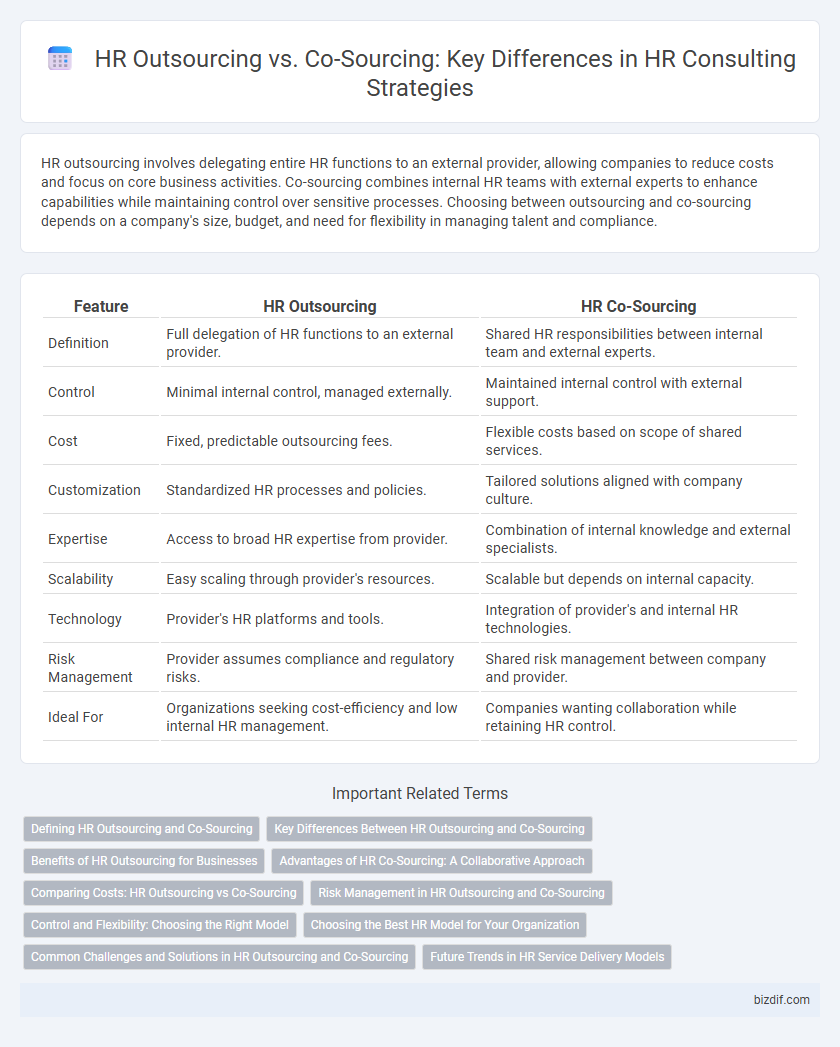HR outsourcing involves delegating entire HR functions to an external provider, allowing companies to reduce costs and focus on core business activities. Co-sourcing combines internal HR teams with external experts to enhance capabilities while maintaining control over sensitive processes. Choosing between outsourcing and co-sourcing depends on a company's size, budget, and need for flexibility in managing talent and compliance.
Table of Comparison
| Feature | HR Outsourcing | HR Co-Sourcing |
|---|---|---|
| Definition | Full delegation of HR functions to an external provider. | Shared HR responsibilities between internal team and external experts. |
| Control | Minimal internal control, managed externally. | Maintained internal control with external support. |
| Cost | Fixed, predictable outsourcing fees. | Flexible costs based on scope of shared services. |
| Customization | Standardized HR processes and policies. | Tailored solutions aligned with company culture. |
| Expertise | Access to broad HR expertise from provider. | Combination of internal knowledge and external specialists. |
| Scalability | Easy scaling through provider's resources. | Scalable but depends on internal capacity. |
| Technology | Provider's HR platforms and tools. | Integration of provider's and internal HR technologies. |
| Risk Management | Provider assumes compliance and regulatory risks. | Shared risk management between company and provider. |
| Ideal For | Organizations seeking cost-efficiency and low internal HR management. | Companies wanting collaboration while retaining HR control. |
Defining HR Outsourcing and Co-Sourcing
HR outsourcing involves delegating entire human resources functions, such as payroll, recruitment, or employee benefits management, to an external service provider, allowing companies to focus on core business activities while reducing operational costs. Co-sourcing is a hybrid approach where companies collaborate with external HR experts to supplement their internal teams, sharing responsibilities and leveraging specialized expertise without fully relinquishing control. Both strategies aim to optimize HR efficiency but differ in the level of internal involvement and customization of HR processes.
Key Differences Between HR Outsourcing and Co-Sourcing
HR outsourcing involves delegating entire HR functions like payroll, recruitment, and compliance to an external provider, reducing internal workload and operational costs. Co-sourcing combines internal HR teams with external consultants who provide specialized expertise, fostering collaboration while retaining control over core HR activities. The key differences lie in control level, resource allocation, and customization, with outsourcing offering comprehensive service packages and co-sourcing emphasizing shared responsibility and flexibility.
Benefits of HR Outsourcing for Businesses
HR outsourcing offers businesses scalable access to specialized expertise, reducing operational costs and administrative burdens. It enhances compliance with labor laws and regulations by leveraging experienced professionals dedicated to HR functions. Companies can focus on core activities while improving efficiency and employee satisfaction through streamlined HR processes.
Advantages of HR Co-Sourcing: A Collaborative Approach
HR co-sourcing combines the expertise of internal HR teams with specialized external consultants, enhancing flexibility and access to advanced resources while maintaining control over strategic decisions. This collaborative approach improves compliance management, talent acquisition, and employee development through shared responsibilities, leading to increased efficiency and cost-effectiveness. Companies benefit from tailored HR solutions that align with their unique culture and objectives, fostering sustainable growth and employee satisfaction.
Comparing Costs: HR Outsourcing vs Co-Sourcing
HR outsourcing typically offers lower upfront costs by transferring entire HR functions to an external provider, reducing the need for in-house staff and infrastructure investment. Co-sourcing involves sharing HR responsibilities between internal teams and external experts, leading to moderate expenses that balance control with expertise. Businesses seeking cost-efficient flexibility often weigh these models based on the scale of HR needs and budget constraints.
Risk Management in HR Outsourcing and Co-Sourcing
HR outsourcing transfers risk management responsibilities to the external provider, reducing internal liability but requiring rigorous vendor due diligence to mitigate compliance and data security risks. In contrast, HR co-sourcing shares risk management duties between the company and service provider, enhancing control and flexibility while benefiting from external expertise to address regulatory changes and employee relations issues. Effective risk management in both models depends on clearly defined roles, transparent communication, and consistent monitoring of service level agreements (SLAs).
Control and Flexibility: Choosing the Right Model
HR outsourcing transfers full responsibility for HR functions to an external provider, offering less direct control but greater operational flexibility and cost efficiency. Co-sourcing blends internal HR management with external expertise, allowing organizations to maintain strategic control while accessing specialized support. Selecting the right model depends on balancing the need for control over HR processes with the desire for scalable flexibility and resource optimization.
Choosing the Best HR Model for Your Organization
Choosing the best HR model for your organization involves evaluating your company's size, budget, and specific HR needs to determine whether HR outsourcing or co-sourcing offers greater flexibility and control. HR outsourcing transfers full responsibility of functions like payroll, benefits, and compliance to external experts, reducing internal workload but potentially limiting customization. Co-sourcing combines internal HR capabilities with specialized external support, allowing companies to maintain strategic oversight while leveraging expert resources for complex tasks such as talent management and regulatory compliance.
Common Challenges and Solutions in HR Outsourcing and Co-Sourcing
HR outsourcing often faces challenges such as loss of control, communication gaps, and data security concerns, which can be mitigated by selecting vendors with robust compliance frameworks and clear service level agreements. Co-sourcing addresses these issues by enabling companies to retain strategic oversight while leveraging external expertise for specialized tasks, fostering better alignment through integrated teams and shared technology platforms. Both approaches benefit from continuous collaboration, transparent performance metrics, and adaptive contract management to ensure responsiveness to evolving organizational needs.
Future Trends in HR Service Delivery Models
Future trends in HR service delivery models emphasize a hybrid approach combining HR outsourcing and co-sourcing to enhance flexibility and scalability. Organizations increasingly leverage technology-driven platforms and AI to streamline HR processes while maintaining strategic control through co-sourcing partnerships. Data analytics and cloud-based solutions are pivotal in customizing HR services, enabling proactive talent management and improved decision-making across diverse business environments.
HR outsourcing vs co-sourcing Infographic

 bizdif.com
bizdif.com